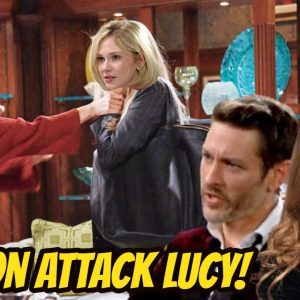Billy Abbott finds himself in a whirlwind of emotions, unable to process Chelsea Lawson’s shocking confession.
When Chelsea finally admitted to hooking up with Adam Newman, Billy’s world shattered. Initially, disbelief clouded his mind, but Chelsea’s detailed admission left him numb and directionless. The aftermath of Chelsea’s revelation saw Billy venting his fury at the park, a clear indication of his unresolved anger.
From August 26 to 30, Billy’s rage will target Adam. Confronting Adam will offer a temporary respite, but the looming issue with Chelsea remains unresolved. As Billy grapples with his next move, Chelsea is determined to mend their relationship. She pleads for another chance, assuring Billy it was a one-time mistake and that she wants to rebuild their trust.
Billy’s decision isn’t straightforward. Aware of Chelsea’s mental health struggles, he grapples with the consequences of pushing her too hard. Connor Newman’s concerns, a catalyst for the indiscretion, add another layer to his contemplation. While Billy partially blames Adam for exploiting Chelsea’s vulnerability, he struggles with Chelsea’s repeated lapses in judgment.

Historically, Chelsea and Adam’s entanglements have led to heartbreak for Billy. Recalling instances where Chelsea betrayed him for Adam makes him question the sustainability of their relationship. The possibility of a future with Chelsea feels fraught, especially with Sally possibly leaving Adam and freeing him to pursue Chelsea again.
Billy faces a tough dilemma. Should he forgive Chelsea and attempt to start anew, or sever ties for good? While reconciliation might seem like a path to redemption, it carries risks of future betrayals, especially if unresolved issues linger. There’s no certainty that forgiveness will ensure a stable future.
Meanwhile, Faith Newman’s accident throws Sharon Newman into emotional turmoil. The incident, eerily reminiscent of Cassie Newman’s tragic death, strikes a deep chord, exacerbating Sharon’s anxiety, particularly because she isn’t adhering to her prescribed medication regimen. Lucy Romalotti, desperate for companionship, finds herself drawn to Faith but fails to heed early warnings.
This summer’s storyline quickly revisits past traumas, reviving painful memories for Sharon and Nick Newman. Their discovery that Faith was hurt while aiding a drunken Lucy resonates deeply, invoking past scars from Cassie’s demise. The controversial decision to kill off Cassie historically served to split Sharon and Nick, a rift filled with immeasurable emotional fallout.
Faith’s recent distractions, including her breakup with Moses Winters, haven’t helped matters. Her perceptive nature sensed Sharon’s troubles, contributing to her decision to forgo her medication. The audience’s discontent grew as characters failed to prioritize resolving these issues, a situation exacerbated by Cameron Kirsten’s disruptive presence.
Sharon’s internal battle heightens as Cameron’s voice dominates her troubled thoughts. Despite not being physically haunted, Sharon’s struggle with these intrusive memories justifies her vengeful plans. This internal conflict might precipitate dire consequences involving Phyllis, Daniel, and Lucy.
As the story progresses, the physical recovery of Lucy and Faith is shadowed by underlying emotional struggles. Lucy’s drinking, borne out of anxiety and low self-esteem, presents a perilous influence on Faith. Despite Faith’s attempts at friendship, Lucy’s dependency on alcohol continues to jeopardize their relationship.
Faith’s remorse after the accident underscores a deeper psychological burden. Repeatedly apologizing to her parents, she internalizes the incident, feeling responsible for reviving their painful past. This overwhelming guilt could potentially lead Faith down a path of self-destructiveness, mirroring the fears surrounding Lucy.
Faith typically confides in Sharon, but with Sharon dealing with her own psychological battles, Faith might suppress her feelings. Sharon’s façade of enduring mere nightmares instead of admitting to vivid hallucinations places additional strain on Faith. The compounded pressures on both characters set the stage for Faith’s potential succumbing to alcohol as a means of coping with her unaddressed guilt.





